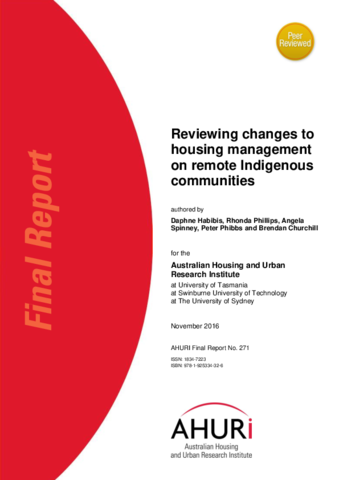This research reviews the progress and achievements of tenancy management reforms to remote Indigenous housing that followed the introduction of the National Partnership Agreement on Remote Indigenous Housing (NPARIH) in 2008.
These reforms marked a new stage in a major policy change in remote Indigenous communities involving the transfer of housing services from the Indigenous Community Housing Organisation (ICHO) sector to the states and the Northern Territory. The reforms are part of a suite of policies under the National Indigenous Reform Agreement that aim to improve the lives, living conditions and wellbeing of Indigenous people. The study is not a review of NPARIH and because it is concerned with the remote Indigenous communities nationally, it includes some consideration of non-NPARIH communities.
The study shows that state housing departments have come a considerable way in implementing public housing like tenancy management standards to some remote Indigenous communities. Where NPARIH investments have taken place, this is generating some improvements in the lives of tenants. Tenancy management is beginning to be systemic rather than crisis driven and there is greater consistency in the quality of housing and housing management. Most tenants surveyed agreed that housing and living conditions had improved and that overall things in the community are better. Those in new and refurbished housing reported being satisfied with them. Respondents understood requirements for paying rent and were keen to maintain their homes in good condition. They were aware of policies on visitors and on reporting property damage.


